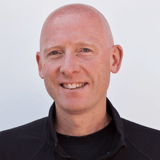Summary
Maria, Megan, and Hannah engage the audience with insights from their experiences leading UX and design initiatives in large organizations. Christine asks about sharing a design playbook, which Megan confirms they maintain collaboratively and iteratively within her team. Chuck Chambers raises the challenge of balancing scrappy startup agility with imposed rules, to which Megan responds that fostering constant questioning and team challenge is vital. Hannah introduces the concept of positive deviants — individuals who break from norms but achieve better results — and emphasizes leveraging community and social proof to spread these behaviors without top-down imposition. On burnout, Maria and Megan share how field trips, variety in work, and strong leadership culture supporting work-life balance help sustain team wellness. Lucas’s question about maintaining optimism amid messy change leads to a shared approach of focusing on advocates, not opponents, and rising by small wins that build momentum. Maria describes intuitive goal-setting based on empathy, aligning individuals’ ambitions with larger organizational goals. Renee's query about timing discovery waves reveals they set ambitious but flexible deadlines, prioritizing learning over rigid schedules. Overall, they highlight the importance of choosing battles wisely, grounding change in social dynamics, and encouraging organic growth within teams.
Key Insights
-
•
Maintaining a shared, editable playbook empowers teams to continuously evolve processes collaboratively.
-
•
Scrappy behaviors are best preserved by encouraging the entire team to question established rules, rather than assigning that to a single role.
-
•
Positive deviants who succeed by breaking from norms should be identified and supported to spread better practices through peer influence and community involvement.
-
•
Preventing designer burnout involves connecting with users directly, diversifying project scopes, and fostering a culture prioritizing mental wellness and work-life balance.
-
•
Change initiatives gain traction when they focus on advocates who already see value in new approaches, rather than trying to convert skeptics immediately.
-
•
The metaphor of not making a new road but finding a slightly different path illustrates incremental, community-driven change.
-
•
Goal-setting in complex projects can be intuitive and empathy-driven, aligning team members’ personal ambitions with organizational objectives.
-
•
Deadlines on discovery and development waves should be ambitious yet flexible, valuing learning and quality over rigid timing.
-
•
Leadership modeling balanced work norms and actively protecting team members during stressful times mitigates burnout and sustains morale.
-
•
Choosing the ‘hill to die on’ requires evaluating impact versus effort and tactically navigating organizational resistances without fighting every battle.
Notable Quotes
"Chris, I definitely would share the playbook, though it's currently under a security layer, but happy to talk about what it consists of."
"It's all of our job to question why we're doing what we're doing and how we're doing it."
"Positive deviants are people operating on the fringes who are doing things differently and getting the best results."
"Change has to come from within; external imposition rarely works."
"Taking field trips, like going on trains with the team, is like meditation — it keeps me connected to users and away from screens."
"We keep our playbook in a place where anyone on the team can edit it, so it keeps evolving."
"You have to pick your battles and choose hills worth dying on."
"We focus on advocates already engaging in positive behavior rather than trying to convince the skeptics right away."
"It’s not a fight; we’re just helping people do what they want to do better."
"Deadlines are theoretical and move, and that’s okay because we’re learning and evolving throughout."
Or choose a question:















More Videos

"In a landscape focusing on efficiency and profit, we need to help design transition from production to strategic focus."
Angelos ArnisNavigating the Rapid Shifts in Tech's Turbulent Terrain
October 2, 2023

"Prioritizing design ops work is tough amid competing priorities and limited time and budget."
John Calhoun Rachel PosmanBring your DesignOps Story to Life! The Definitive DesignOps Book Jam
October 3, 2023

"We were allowed to taste the cake, not bake the cake; this process got UX into the kitchen."
Alfred KahnA Seat at the Table: Making Your Team a Strategic Partner
November 29, 2023

"Outside of our keyholes lies information that we’re completely oblivious to that can come to haunt us."
Dan WillisEnterprise Storytelling Sessions
June 3, 2019

"If you feel like a doormat trying to earn your place in design, sometimes the best advice is to change jobs."
John Maeda Alison RandAbout Design Organizations (Videoconference)
May 13, 2019

"When I interviewed everyone, I asked what success meant to them specifically to inform my UX roadmap."
Anat Fintzi Rachel MinnicksDelivering at Scale: Making Traction with Resistant Partners
June 9, 2022

"How do you create a sense of craft in an environment fraught with ambiguity, complexity, and anxiety?"
Uday GajendarThe Wicked Craft of Enterprise UX
May 13, 2015

"We’re seeing a shift away from attribution to focus more on impact on the experience itself."
Kristin SkinnerTheme 1 Intro
September 29, 2021

"You might feel like one of the blind men in the story when parts of a process don’t show the whole picture. That’s why you need the full journey exposed."
Maish NichaniSparking a Service Excellence Mindset at a Government Agency
December 9, 2021
















